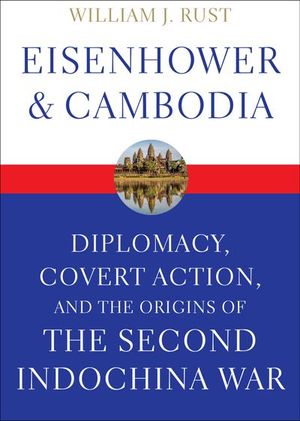Eisenhower & Cambodia
Published by The University Press of Kentucky
This historical study examines America’s Cold War diplomacy and covert operations intended to lure Cambodia from neutrality to alliance.
Although most Americans paid little attention to Cambodia during Dwight D. Eisenhower’s presidency, the global ideological struggle with the Soviet Union guaranteed US vigilance throughout Southeast Asia. Cambodia’s leader, Norodom Sihanouk, refused to take sides in the Cold War, a policy that disturbed US officials. From 1953 to 1961, his government avoided the political and military crises of neighboring Laos and South Vietnam. However, relations between Cambodia and the United States suffered a blow in 1959 when Sihanouk discovered CIA involvement in a plot to overthrow him. The failed coup only increased Sihanouk’s power and prestige, presenting new foreign policy challenges in the region.
In Eisenhower and Cambodia, William J. Rust demonstrates that covert intervention in the political affairs of Cambodia proved to be a counterproductive tactic for advancing the United States’ anticommunist goals. Drawing on recently declassified sources, Rust skillfully traces the impact of “plausible deniability” on the formulation and execution of foreign policy. His meticulous study not only reveals a neglected chapter in Cold War history but also illuminates the intellectual and political origins of US strategy in Vietnam and the often-hidden influence of intelligence operations in foreign affairs.
Although most Americans paid little attention to Cambodia during Dwight D. Eisenhower’s presidency, the global ideological struggle with the Soviet Union guaranteed US vigilance throughout Southeast Asia. Cambodia’s leader, Norodom Sihanouk, refused to take sides in the Cold War, a policy that disturbed US officials. From 1953 to 1961, his government avoided the political and military crises of neighboring Laos and South Vietnam. However, relations between Cambodia and the United States suffered a blow in 1959 when Sihanouk discovered CIA involvement in a plot to overthrow him. The failed coup only increased Sihanouk’s power and prestige, presenting new foreign policy challenges in the region.
In Eisenhower and Cambodia, William J. Rust demonstrates that covert intervention in the political affairs of Cambodia proved to be a counterproductive tactic for advancing the United States’ anticommunist goals. Drawing on recently declassified sources, Rust skillfully traces the impact of “plausible deniability” on the formulation and execution of foreign policy. His meticulous study not only reveals a neglected chapter in Cold War history but also illuminates the intellectual and political origins of US strategy in Vietnam and the often-hidden influence of intelligence operations in foreign affairs.
BUY NOW FROM
COMMUNITY REVIEWS
